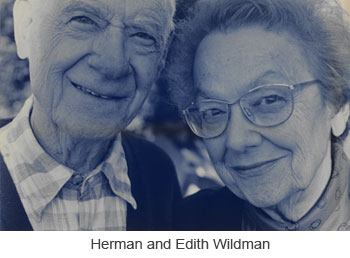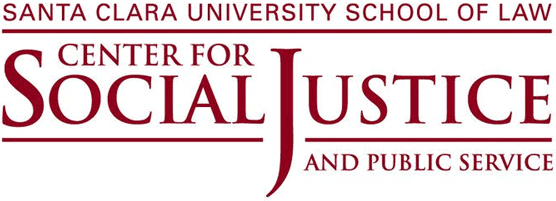The Herman and Edith Wildman Social Justice Law Writing Award
The Herman and Edith Wildman Social Justice Law Writing Award will be given to the best student essay (or essays) on a Public Interest and Social Justice Law topic. Students are encouraged to submit papers written for a class, law review, or other purpose any time between spring semester of the preceding year and spring semester of the current year.
The Herman and Edith Wildman Social Justice Law Writing Award honors the memory of Herman Wildman, 1912-2002, who practiced law in New York and California, and the memory of Edith Wildman, 1921-2015, a teacher and librarian. The winner or winners will receive an honorarium and a certificate.
Papers will be judged by faculty members who did not supervise the writing project.
The application deadline is noon on April 10, 2025 @ Noon. Please submit your paper to Kerrie Bindi, at kbindi@scu.edu. The paper must be submitted in Word and must be accompanied by a cover sheet giving your name and contact information (phone and email); the title of your paper; the name of the course for which you wrote the paper; if any, and the name of the writing supervisor or course instructor, if any. Please direct any questions to Kerrie Bindi, at kbindi@scu.edu.
 Herman Wildman, 1912-2002, was born in New York City, attended City College of New York, and graduated from St. John’s University School of Law. He was honorably discharged from the U.S. Army after serving in World War II with the 88th Infantry “Blue-Devil” Division. As a member of the New York bar, he practiced with the law offices of George J. Mintzer, which included associates Thomas J. Todarelli and Hubert T. Delaney. He became a member of the California bar in 1953, where he continued his work as a general practitioner in solo practice in Los Angeles. He was married for 55 years to Edith Wildman, and they always took great pleasure in their children and grandchildren.
Herman Wildman, 1912-2002, was born in New York City, attended City College of New York, and graduated from St. John’s University School of Law. He was honorably discharged from the U.S. Army after serving in World War II with the 88th Infantry “Blue-Devil” Division. As a member of the New York bar, he practiced with the law offices of George J. Mintzer, which included associates Thomas J. Todarelli and Hubert T. Delaney. He became a member of the California bar in 1953, where he continued his work as a general practitioner in solo practice in Los Angeles. He was married for 55 years to Edith Wildman, and they always took great pleasure in their children and grandchildren.
Edith Wildman, 1921-2015, graduated from Brooklyn College and Teachers’ College of Columbia University. She taught elementary school and junior high in New York City. She did volunteer work for Los Angeles public schools and Jewish libraries for many years. She was an avid reader and always valued good writing.
Past Wildman Writing Award Recipients
2023 Recipients
Leah Faibisoff
The ‘Long Arm’ of State Law after Dobbs: Civil Liability for Out-of-State Physicians?
Honorable Mention:
Alexandria Morones
Preserving a Voice: Recommendations for Prioritizing Tribal Access to Radio Broadcasting.
2022 Recipient
Marissa Blasing
Gender Inequities, the Covid-19 Shecession, and the Need for a Conscious Reformation
2021 Recipient
Romae-Anne Aquino
Policy Brief: The Case For Granting Legal Status To Undocumented Agricultural Workers.
2020 Recipient
Maggie Cockayne
Foster to Adopt: Pipeline to failure and the need for concurrent planning reform
2019 Recipients
Hannah Ford-Stille
Regulated & Hydrated: A Case for Regulating Bottled Water
Daniel Johnston
Commodifying Division: Surrogacy & Racial Distancing
2018 Recipient
Julia Schon
Why Are California’s Prisons and Streets Filled with More Mentally Ill Than its Hospitals?
2017 Recipients
Erik Aucoin
Empathy Leads to Death: Why Empathy is an Adversary of Capital Defendants
Joshua Seitz
Striking a Balance: Policy Considerations for Human Germline Modification
2016 Recipient
Michael Tsivyan, ’18
Ambiguity in the Standard of Appellate Review of Fee Awards Under Public Interest Fee-Shifting Statutes
2016 Honorable Mentions
Lisa Greenburg, ’16
Behind Arizona’s Walls of Silence: The Tragic Consequences of Cloaking Lethal Injection Protocols in Secrecy
Keelikolani Ho, ’16
Responding to Drought: Farmers, Fields, and Water in California Today
2015 Recipient
Mallory Barr ’17
The Battle at Home: Protecting Service Members’ Rights and Interests in Family Court
2015 Honorable Mention
Adam Belsey ’16
When Innocence is Confidential: A New Exception to Attorney Client Confidentiality is Essential
2014 Recipient
Matthew Volkmann ’14
No Accident: Racial Bias in the American Tort System
2013 Recipient
Hazella Bowmani ’14
The Significance of Stereotypes in Adjudicating LGBT Asylum Claims
2012 Recipients
Susannah Ragab
Wrestling with the ROSCA-Examining the Sustainability of Community Credit Markets Through the Lens of Korean “Kye”
Marc Wiesner
Efficacy and United States Trafficking Victims Protection Act: The Need for Treble Damages in the Private Right of Action
2011 Recipient
Jennifer McAllister
We’re Not Taking New Patients Right Now: Lack of Access to Health Care for Transgender Patients as a Public Health Crisis
2010 Recipient
Sarah Mercer
Tongue Tied: Women at the Intersection of Language Access and Reproductive Health Care Policies
The United States is experiencing immigration settlement patterns that are and will continue to impact health care. At the same time, women of color and immigrant women continue to experience dangerously high rates of health disparities. This paper explores current federal and state language access policies and the provision of reproductive health care within the context of these factors.
2009 Recipients
Elizabeth Coleman
Newtonian Mechanics: The Debate Over Physical Force as Applied to 18 U.S.C. § 922(g)(9) and its Implications for Domestic Violence and the Military
The Lautenberg Amendment changed the gun control statute to prohibit anyone convicted of a misdemeanor crime of domestic violence from possessing a gun. However, due to congressional oversights, there are differing interpretations of several of the key statutory terms in the Amendment. This paper examines the implications in the civilian and military contexts of the circuit split over the meaning of “physical force”as it pertains to the Lautenberg Amendment, and offers solutions as to how to better protect domestic violence victims and their families.
Brandon Douglass
A Case for States: Making Blanket Primaries Constitutional in the Post-Jones Era
This paper examines the Supreme Court’s treatment of blanket primary systems specifically, and the associational freedoms of political parties at large. It proposes that blanket primaries, when assessed alongside the Court’s associational rights jurisprudence, are constitutional and do present an effective means of combating partisan gridlock for state and local governments.
2008 Recipient
Abdul Al Hamamsy
Avian Influenza Pandemic: A Comprehensive Preparedness Plan for a National Security Threat
The topic of this paper is a global preparedness plan for an avian influenza (H5N1) pandemic. Abdul stresses the importance of Congressional action to cooperate with the World Health Organization according to its new International Health Regulations, which gave the WHO unprecedented legal powers.
2007 Recipient
Jennifer Alesio
Reconceptualizing Although I Do Not Hope: Evaluating Revolutionary Educational Reform in the Era of Retrenchment
This paper evaluates three distinct and dramatic remedies to educational inequality, magnet schools, New Jersey’s “Abbott Districts” and the Harlem Children’s Zone. Two of these reforms altered the mechanism of education, and one is altering the premise of education.
2007 Honorable Mention
Olivia Serene Lee
Making the Case to Desegregate Public Schools in a Time of Resegregation: A San Franciscan Chinese American Perspective
Using a critical race theory approach to explain the circumstances that let to the current trend of resegregation among San Francisco public schools, this paper explores a school admission program that the San Francisco public school system can adopt to address this problem. One of the key components to the proposed program is the adoption of race as a factor in school admissions, which would require the school system to consider several legal hurdles: strict scrutiny analysis, Proposition 209, and the settlement agreement of Ho v. San Francisco Unified School District. After analyzing these hurdles, this paper concludes that the proposed program is likely to be valid if contested.
2006 Recipient
Pami Vyas
Reconceptualizing Domestic Violence in India: Economic Abuse and the Need for Broad Statutory Interpretation to Promote Women’s Fundamental Rights
This paper explores the reconceptualization of domestic violence in India through an analysis of the economic abuse provision of the recently passed Domestic Violence Act. Although India has taken a significant step towards advancing women’s rights by characterizing economic abuse as a form of domestic violence, effective implementation of the law requires a broad interpretation of the economic abuse provision.
2006 Honorable Mention
Pamela Vartabedian
The Need to Hold Batterers Accountable: Admitting Prior Acts of Abuse in Cases of Domestic Violence
The current schemes in the majority of state evidence codes do no adequately protect domestic violence victims. Only two states, California and Alaska, have adopted legislation allowing propensity evidence in domestic violence cases. In order to hold batterers accountable, states must adopt evidence rules that admit evidence of
2005 Recipient
Jennifer Briggs
Protecting Pregnant Workers: Anti-Discrimination Law and Specific Rights in Europe and the United States
This paper analyzes the evolution of laws and policies aimed at protecting pregnant workers. It compares the “equality” versus “difference” approaches in both Europe and the United States. Finally, This paper advocates for a ”specific rights” approach to protecting pregnant women in the workplace.
2004 Recipient
Susan Hunt
Feminism of the Future: Unmodified or Unified?
This paper explores the further development of feminist theory and its potential to evolve into a theory to address all forms of subordination. The author maintains that feminist theory needs to develop beyond the limitations of rigid categorical approaches. However, a unified theory does not mean that women must fit into a uniform pattern.
2004 Honorable Mention
Kirsten Bowman
Bridging the Gap in the Hopes of Ending Female Genital Cutting
2003 Recipient
Stephanie Grogan
Liberty v. Security: Does Security Always Win or Can They Co-Exist During Times of War?
Constitutional rights and civil liberties have been eroded because of the government’s “War on Terrorism.” Examining this theme in the context of lower court cases infringing the rights of citizens and non-citizens deemed “enemy combatants” or “enemies,” this paper focuses on the implications of the Administration position in these cases and the dangers posed to individual rights.
Dori Lynn Yob
Mistaken Identifications Cause Wrongful Convictions: New Jersey’s Lineup Guidelines Restore Hope, But Are They Enough?
Mistaken eyewitness identification is the leading cause of wrongful conviction in the United States, often because of bias in the lineup procedure. Critiquing recent lineup guidelines adopted in New Jersey, this paper proposes the adoption of “Miranda-like” guidelines.
2002 Recipient
Christine Carlson
Invisible Victims: Holding the Educational System Liable for Teen Dating Violence at School
Despite the documented presence of dating violence in many teens’ lives and the increased emphasis on curbing teen violence in schools, middle and high schools as a whole do not educate their student populations about dating violence even though there are strong parallels between teen dating violence and teen violence generally. Schools legally have the ability to control their students’ behavior, and a school’s failure to do so can result in legal liability in specifically defined situations and circumstances. The article reviews cases in which both state and federal courts, including the United States Supreme Court, have held schools and districts liable for student harassment and student-on-student violence and outlines several options school districts should consider to avoid liability for teen dating violence.
